Bundesliga MD 14 – Dortmund vs. Bayern
If you talk to people close to Borussia Dortmund about the club’s ambitions, it often feels like the club is caught in a perennial identity crisis. After all, they had entered the past decade so extremely successfully, but the last few years have seen one setback after another for the club – at least in comparison to the industry leaders from Bavaria, whose serious mistakes over the past ten years can be counted on one hand.
A phrase that Dortmund CEO Hans-Joachim Watzke recently murmured on German football channel Sky often comes up in connection to Dortmund: “The best year to snatch Bayern was 2018/19, but we didn’t do it.” The 62-year-old admitted: “That was not a particularly good performance from us either. You have to say that honestly. When at one point you’re nine points ahead and if you go into the Christmas break still six points ahead, then maybe you should be able to see it through.”
As a reminder, Bayern played a weak first half of the season under their then new coach Niko Kovač, but rallied in the second half of the year and put together an impressive series that even brought them the double in the end. Dortmund, plagued in the meantime by absences of important players, could not keep up the pace of the Hinrunde and lost ground. In the end, the title was decided in favour of FC Bayern on the last matchday and Dortmund fell three points short of the championship.
Dortmund sit between the stools
At Dortmund, they are still painfully aware that this opportunity may not arise again so quickly. In the past, they liked to say that they had to be there when Bayern floundered. But it is also true that Bayern’s weakest seasons in recent years have each resulted in 78 points. A figure that has only been broken once in the history of the Bundesliga by a team other than FC Bayern: Dortmund in 2011/12.
That alone illustrates the historic challenge facing the record champion’s rivals at the moment. Nevertheless, this should not be used as an excuse for their own mistakes, of which there may well have been a few too many at Dortmund in recent years. Conversely, this does not necessarily mean that they would have won the championship if they had not made these mistakes, but anyone who has followed the club closely in the recent past is unlikely to have come to the conclusion that they have used their considerable potential to its fullest.
On the one hand, there were great transfers like those of Jadon Sancho, Erling Haaland, Jude Bellingham or even Giovanni Reyna, who caused a comparatively low financial outlay and were able to double, triple or, in the case of Haaland, even septuple their market value within a very short time.
On the other hand, however, this season in particular shows the tightrope Dortmund regularly walk when they incur high financial costs for supposedly very talented players who ultimately might not to be able to make the step up and become the next top player in the squad.
Too much mediocrity at Borussia Dortmund
Nico Schulz (transfer fee of around €25 million), Emre Can (transfer fee of around €25 million), Julian Brandt (transfer fee of around €25 million) are three examples of players whose strengths and weaknesses can certainly be discussed in different contexts but who have one thing in common: They have not been consistently convincing in relation to the transfer fee and the expectations placed in them.
In addition, there are loans such as that of Marin Pongracic. In an interview with Kicker, Pongracic himself was almost surprised that he never used to play that much at Wolfsburg but suddenly played very often for Dortmund. His performances since his move in the summer have fluctuated greatly and so he is likely to fall back into the substitute role when Zagadou is fit again.
In the Dortmund squad, behind a very good first eleven, there is too much mediocrity. Mediocrity that in some cases takes home a lot of money. Marius Wolf, for example, earns around €5 million a year. After two unsuccessful previous attempts at Dortmund, he is now trying his luck a third time. While certainly more successful than in previous years, he is not really endowed with the quality required for the club’s ambitions.
More than just ample spatial distance between the two leaders
So as it is true for the Bundesliga at large, Dortmund’s squad planning is somewhere in between sensationally good and running below capacity. And that is ultimately the reason why, before a duel with Bayern, they appear confident but not really ambitious.
Nevertheless, a victory tonight against their major rivals is certainly possible. And this is more than a pipe dream of Dortmund because things have become unsettled at FC Bayern recently. Dortmund trust in their qualities, know that many players have returned (especially Haaland) and that they will field an eleven that can manage to beat the record champions in one game.
But in all likelihood it will not be enough for more. That is why Watzke, when asked about the championship, recently said: “I don’t want to overload the team with expectations.” While on the one hand people nod their heads in agreement, murmuring “realism”, on the other side of the aisle there are smug smiles and claims that it would only take courage and even harder work for Dortmund to finally be able to strike back. This is a discrepancy between two positions that ultimately also reflects how far apart FC Bayern and Borussia Dortmund have moved.
A game is just a game – not 34
Both arguments have have something to them but given the huge financial gulf between the two clubs, irrespective of the mistakes Dortmund have made in recent years, it must be said that Bayern cannot be caught – not even in one season, as long as they do not string a series of calamitous mistakes together.
In one game, however, and that is what is at stake on Saturday night, the situation is different. Although Dortmund’s record is similarly devastating, with just three wins from their last 15 encounters, it has almost always been close between the two flagships of the men’s Bundesliga, especially in Dortmund.
And this year? Both Bayern and Dortmund go into the duel weakened. Weaknesses that could become a problem in view of the strengths of their opponents.
Three Dortmund weaknesses that suit Bayern
1. Defending the width
Especially when they are in defensive transition immediately after losing the ball, Dortmund have problems initiating their gegenpressing, but also falling back behind the ball in an orderly fashion after their first pressing line is overcome. They are particularly vulnerable on the flanks, as the Wolfsburg attack leading to the 1-0 lead last weekend showed.
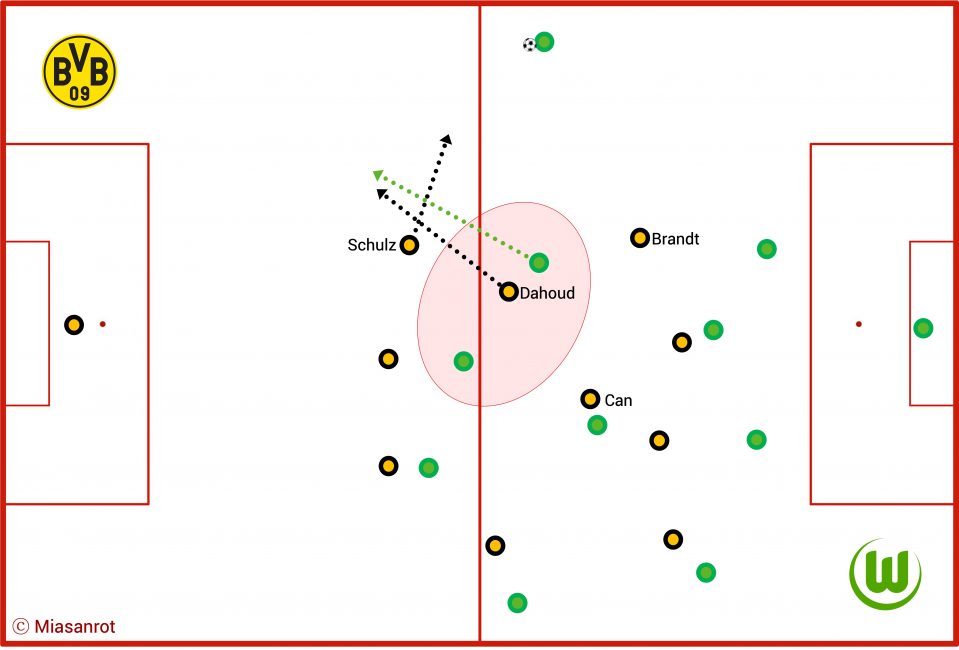
Initially, Wolfsburg can switch play to the right wing, where Baku has space to surge ahead. In the centre, Dortmund are missing at least one player in the six-yard area to allow Dahoud to help protect the far side earlier. Schulz has to move out, Dahoud is drawn out by his opponent too, because he has to shift with him to prevent a potential pass in behind.
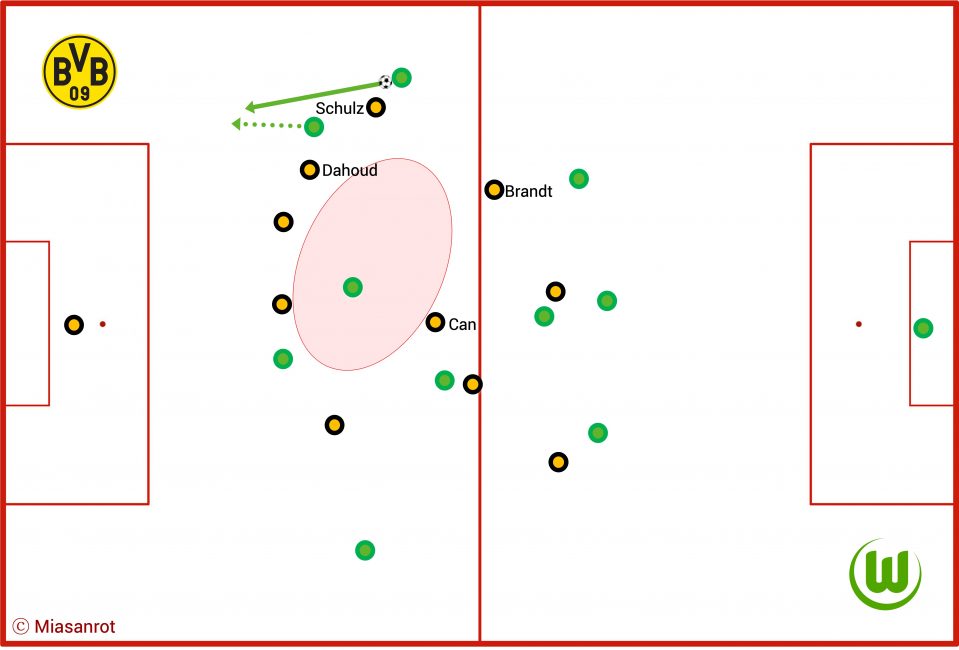
But he does not manage to get there in time and Baku can break through on the wing. Schulz is tangled up for a moment in a one-on-two. Brandt and Can track back too late again. The gap between the defence and the five attacking Dortmund players is too big, so Dahoud can only react. Wolfsburg play out the situation on the wing and score from an acute angle, but could also have been successful with a cross into the far area of the ball or a cut back because Dortmund’s structure has too many holes.
With players like Alphonso Davies, Kingsley Coman and Serge Gnabry, Bayern are ideally suited to launch such speed attacks as Wolfsburg did in this situation all the time.
2. Defending the half spaces
This especially as Dortmund not only have problems after losing the ball. In defensive midfield there is generally a problem that Dortmund’s 4-3-3 or 4-1-2-3 does not always manage to handle: There are unclaimed spaces to the right and left of the sole number six that Bayern like to exploit. Thomas Müller and Leroy Sané are the key players between the opponents’ lines in Nagelsmann’s system. Both make themselves available for a pass again and again in that area and then either put the ball out to the wing or on into the penalty area – or recycle it to the back for another go.
If Dortmund want to defend these situations, Rose will probably have to change. Either to a back five from which the half-backs can easily push out, or to a 4-3-3, in which the two number eights are basically positioned a bit deeper. A 4-4-2 diamond with deeper half-space players is also conceivable.
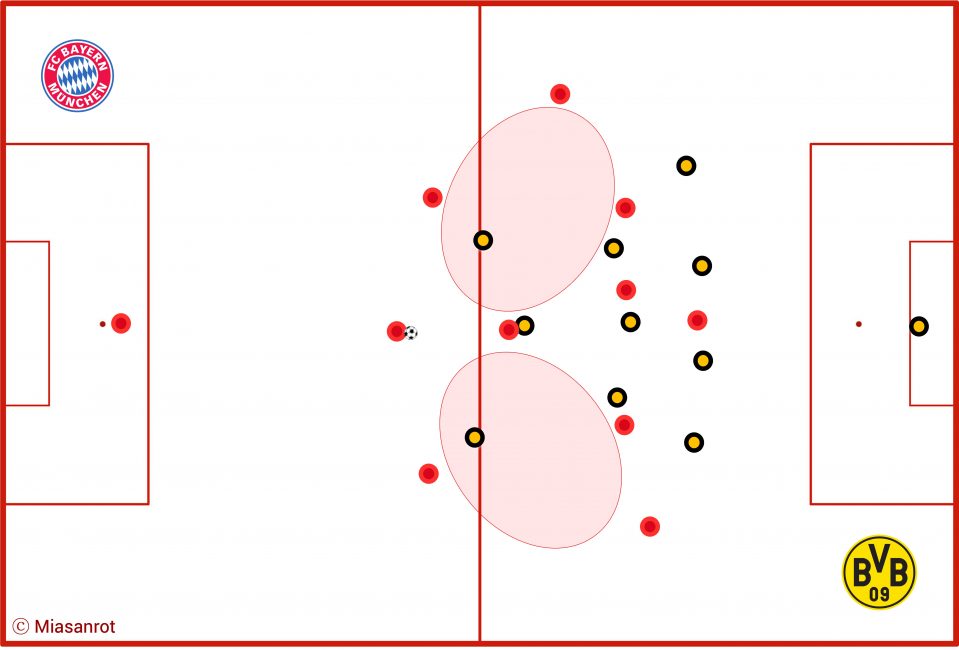
With a diamond, Dortmund could take out Bayern’s playmaking number six in order to direct them to the wings early on and avoid dangerous shifts like that before the first Wolfsburg goal. A formation with two sixes and eights each would possibly take some sting out of Bayern’s attacking game.
3. Build-up play
With the return of Mahmoud Dahoud to BVB’s starting eleven, more ball control returns as well. Nevertheless, Dortmund are not always solid in possession. Players such as Axel Witsel (who was ruled out last time and is unlikely to start) or Emre Can were susceptible to simple ball losses and Julian Brandt, who should have the technical ability, too often got bogged down in unnecessarily risky actions.
And so Dortmund lack the stability in midfield that they actually need to be able to calm down wild phases I the game. Bayern’s pressing focus under Nagelsmann is clearly in the centre, which could lead to them winning one or two balls in dangerous zones, especially in gegenpressing. From Dortmund’s point of view, it is therefore about minimising mistakes in exactly these areas.
Three Bayern weaknesses that suit Dortmund
1. Lack of stability in midfield
Not just Dortmund, Bayern too lack stability in midfield at the moment. Without Kimmich, the record champions’ game shows similar problems to those of Dortmund: they are too often unsorted when they lose the ball.
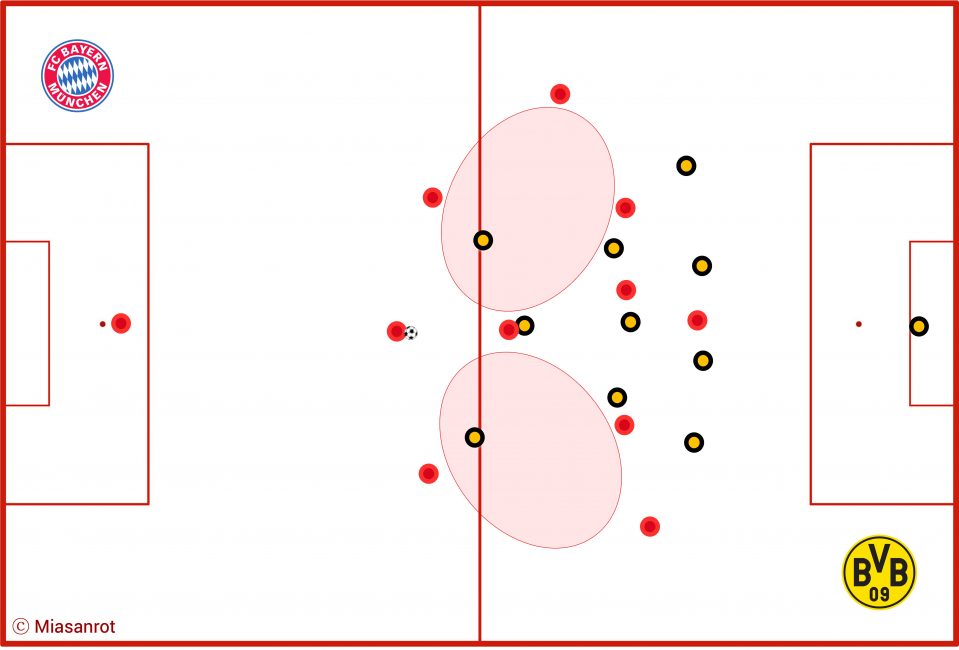
As the previous chart already showed, Nagelsmann’s 3-1-5-1 has had issues playing against deep sitting teams. Not only does the holding midfielder have to run quite a distance to make himself available for a pass, but he also has to defend vertical passes with which the opposing build-up players try to bypass him.
Bayern do not always succeed in gaining immediate access in counter-pressing. That could be an opportunity that Dortmund, who are still very strong in offensive transition, can try to take.
Nagelsmann, too, will have to consider whether to make changes. A designated second number six, who only rarely pushes forward, could help better organise their gegenpressing, because ball losses of this kind cannot be avoided. Dortmund will also exert a lot of pressure in pressing. It is then a matter of maintaining protection when tracking back and anticipating the next attack.
2. Defending spaces away from the ball
In the last Bundesliga encounter between the two teams, Bayern won 4-2, but at the beginning of the game they quickly fell behind 0-2. One of the goals was initiated by an outstanding lateral switch of the play by Dahoud. Under Nagelsmann, Bayern are defending much more alertly and attentively overall than they did under Flick, but the problem of vulnerability away from the ball has not yet been solved.
Bayern therefore concede chances in two different ways: after a cross to the far post or a previous switch that allows the recipient to break through to the middle from the outside. And Dortmund have players who are comfortable dealing with these challenges. Dahoud can play razor-sharp switches even under pressure, while Reus, Malen and also Meunier have proven several times this season that they are capable recipients of these switches.
And in the centre, goal machine Haaland will presumably return, who has already shown during his cameo appearance in Wolfsburg that he has hit the road running after his lengthy injury lay-off. For Bayern, therefore, there are only two approaches to contain the problems: Firstly, more precision near the ball in order to prevent switches across as often as possible. And secondly, the much more difficult task, constant attention to the far side of the pitch away from the ball in order to be able to shift as quickly as possible in the event of a switch.
3. Preparation of wing attacks
How are they going to do that? Wing attacks are Bayern’s strength, which fits in well with Dortmund’s deficits in defending the widths. So how is careful preparation of wide attacks supposed to fit in with Dortmund’s strengths? That does not make any … Yes, I know. Now please let me explain before you start complaining.
It is absolutely correct that Dortmund hav problems defending the widths appropriately. However, as is the case with almost all teams that are weak on the wings, this mainly affects moments when the opponent plays at speed. Like the 1-0 from Wolfsburg described above. Conversely, Bayern are also often only dangerous when there is an element of pace to their game. Be it by dribbling from a standing start (Davies!) or even after a switch.
But this is exactly where Bayern have had problems lately. There were still many breakthroughs on the outside, but these were too rarely the result of well-prepared attacks. In particular this means that the build-up play was relatively predictable. And even if Nico Schulz were the worst left-back in the Bundesliga, which he obviously is not, he would still have enough time in such situations to prepare for a duel. Is that why he will win all duels with Coman, for example? Certainly not. But he will win more than he would from a rolling start in which he first had to shift to the wing.
Especially since in a stationary situation more Dortmund players will come to his aid to narrow the space for an opponent’s dribble. Against Bielefeld, Bayern generated many chances from moments of individual superiority, which they will not have as many of at Dortmund. So it will again be more important to cause problems for the opponents through changes of pace, switches of play and better combinational play through the centre.
This shortcoming of Bayern during the last few weeks does not correspond with any specific strength of Dortmund, but Dortmund will be heartily thanked if Bayern moves the ball around the pitch in the infamous horseshoe shape. As described above: The integration of Sané and Müller in the half spaces could be the Gordian knot breaker here.
Will Dortmund bring some suspense into the “title fight”?
Recent form does not tend to play a major role in these duels. The recent past should have taught us that. But the course of the season so far nevertheless gives reason to hope for a gripping match. Certainly not because both are playing spectacular football at this stage of the season. Rather, because they are both far from being flawless.
Mistakes often lead to goals and ultimately to entertaining games. However, it would not be the first time that such circumstances give rise to a low-scoring and unentertaining match. The personnel situation will also have a major influence. Besides Joshua Kimmich, Bayern may also be missing Serge Gnabry and Leon Goretzka. With Marcel Sabitzer, Eric Maxim Choupo-Moting, Bouna Sarr and Josip Stanišić, players providing the width are also absent. Dortmund, in turn, will probably have to do without Jude Bellingham, Thorgan Hazard and Giovanni Reyna. Raphaël Guerreiro and Erling Haaland are back in the squad after injuries, although it is unclear how fit they are and how many minutes they will be able to play. The Kicker expects both to be in the starting eleven.
Neither coach will be able to add much fuel from the bench – especially offensively. Nagelsmann would still have Jamal Musiala in case of Gnabry’s absence, while Rose would have to rely on Wolf and Tigges in case of necessary substitutions in attack. In any case, it will be interesting to see what happens to Dortmund’s self-confidence. Watzke, for one, was in an attacking mood: “We have won 17 of the last 20 Bundesliga games. You can draw a certain amount of self-confidence from that.” However, this only refers to this one game. Because the Dortmund boss also passes up no opportunity to emphasise one thing regarding the financial gap: “You can make up the disadvantage perhaps on one matchday, but not over 34.”
Unless Bayern slip up exceptionally badly and Dortmund suddenly manage to sustainably run at maximum capacity over an entire season, Watzke’s assessment is likely to remain true for a while yet. The current standings might suggest that Dortmund are meeting their targets despite a few absences. However, their performances so far rather suggest that over 34 matchdays something unforeseen sooner or later will set them back. For the moment, however, they have it in their hands to bring a touch of excitement into the championship battle. Even if only for the moment.

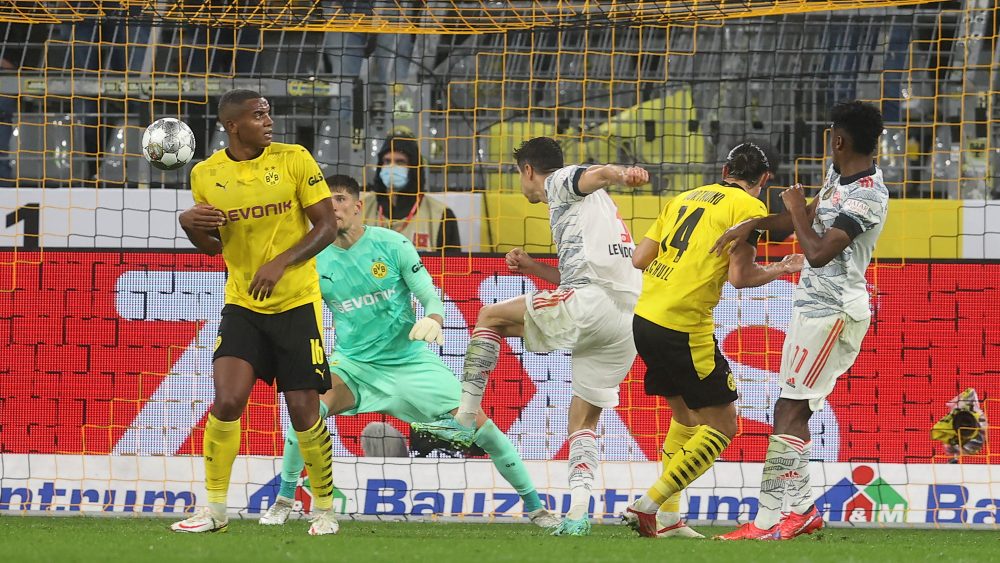






Everyone talking about the goals whilst I’m thinking about how Tolisso missed an open net